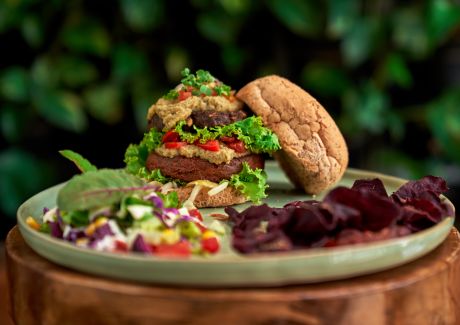
When Burgreen co-founder Helga Angelina Tjahjadi moved to Amsterdam 10 years ago, she met both her future spouse and her co-founder Max Mandias.
Based in Jakarta, Burgreens is an organic healthy plant-based eatery specifically designed for the Asian food palette. Its customer base is mostly non-vegetarian: the more health-conscious omnivores and people who consciously choose to eat less meat due to health and environmental reasons.
Tjahjadi was passionate about vegan diet ever since she was 15 as it had helped her recover from severe chronic ailments while Max had switched to one due to environmental reasons.
The duo started testing out their plant-based recipes in Amsterdam. Later, Tjahjadi was convinced by her husband to move back to Indonesia and start the business from there.
During their initial days, the couple did everything from ideating the menu, making the burger patties, and serving food from Max’s home basement which they converted into a kitchen.
“We started the business, honestly, without a business plan in the first three years. It was really like taking a leap of faith to follow our passion,” Tjahjadi shares with e27.
Surely enough, it was only in the third year where the business took off. However, the road to success was not always smooth sailing.
“We made some mistakes during our initial years. This was because growing too fast before placing new foundations cost us some painful consequences,” she explains the challenges they faced.
“When we started, we had to deal with problems such as fraud. And we learned a lot from the process which was to improve our finance, team and control systems and have a solid foundation.”
She recalls an incident where an employee took orders but did not input it into the system.
“Even though it was a small amount of money, he did it every day, mounting up to a year. So in the end, when we summed it up, it was quite a lot of money.”
However, despite the hurdles, the couple grew their business from a two-man team to a 150 people team with 10 outlets in Jakarta, Tangerang, and Bandung.
The company also recently managed to raise Pre Series A funding from Singapore-based VC firm Teja Ventures and investors from the Angel Investment Network (ANGIN).
She attributes her success to a combination of luck, hard work, and passion, advising fellow entrepreneurs to not be afraid of making mistakes and learning.
The Vegan Landscape
What Burgreens wants to do is to make healthy food mainstream by becoming more affordable.
“In Asian countries, there’s a lot of meat available, which makes them very affordable. But what we’re seeing is that if we want to focus on healthy plant-based eating; it’s not just about the taste but also the nutrition profile. So our focus is not just to mimic the taste and the texture but to also the nutrition profile, and offer people the same amount of protein that they would find in a regular chicken,” she elaborates.
Tjahjadi further outlines that initially, their business had a niche customer base. But the COVID-19 pandemic has helped them to gain more following as many reports identify meat markets as the source of the virus.
She says that there is a growing awareness from millennial groups on healthy food discussions, climate change and reduction of carbon footprint. With all of these factors taken into consideration, the trend is here to stay.
Also Read: She Loves Tech returns for the 6th time as a fully online event
While many Western brands have also recognised the opportunity of plant-based food in the Asian market, companies such as Beyond Meat and Impossible Meat have accelerated their entrance since the start of the pandemic.
What separates Burgreens from these brands is that it focuses specifically to create a plant-based diet that suits the Asian taste palette.

Big Max burger at Burgreens
In Southeast Asia, the plant-based market is estimated to be worth US$14.5 billion by 2025, according to an exclusive report published by MarketsandMarkets.
“Retailers were focused on ensuring the supply of staple foods were available and were less concerned about stocking new plant-based foods. However, consumers have been increasingly demanding more plant-based foods as concerns about food safety and the virus have contributed toward a shift to more plant-based food options,” Andrew Ive, Founder of Big Idea Ventures tells foodingredientsfirst.
The movement has been catching a new force in markets that are only just beginning to hold on to a theme that is already popular in North American and European markets.
–
Image Credit: Burgreens
The post Bringing home the (mock) bacon: How Burgreens aims to transform Jakarta’s vegan food market appeared first on e27.
The post Bringing home the (mock) bacon: How Burgreens aims to transform Jakarta’s vegan food market appeared first on TinySG.
from TinySG https://tinysg.com/bringing-home-the-mock-bacon-how-burgreens-aims-to-transform-jakartas-vegan-food-market/?utm_source=rss&utm_medium=rss&utm_campaign=bringing-home-the-mock-bacon-how-burgreens-aims-to-transform-jakartas-vegan-food-market

No comments:
Post a Comment